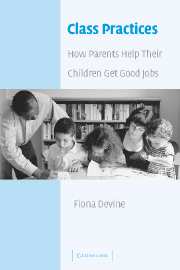Book contents
- Frontmatter
- Contents
- List of tables
- Acknowledgements
- 1 Introduction
- 2 Material help with education and training
- 3 Financial choices and sacrifices for children
- 4 Expectations and hopes for educational success
- 5 Fulfilling potential and securing happiness
- 6 Contacts, luck and career success
- 7 Friends and networks in school and beyond
- 8 Conclusion
- Appendix A The interviewees
- Appendix B Doing comparative research
- Notes
- List of references
- Author index
- Subject index
8 - Conclusion
Published online by Cambridge University Press: 22 September 2009
- Frontmatter
- Contents
- List of tables
- Acknowledgements
- 1 Introduction
- 2 Material help with education and training
- 3 Financial choices and sacrifices for children
- 4 Expectations and hopes for educational success
- 5 Fulfilling potential and securing happiness
- 6 Contacts, luck and career success
- 7 Friends and networks in school and beyond
- 8 Conclusion
- Appendix A The interviewees
- Appendix B Doing comparative research
- Notes
- List of references
- Author index
- Subject index
Summary
I started this book on an autobiographical note talking about my personal experiences of social mobility and that of my sisters and brother. Despite our modest background, my youngest sister Deirdre and myself had the opportunity to go to university and get good professional jobs. Although Barbara did not go on into higher education, she took up the opportunity to train as a nurse in her early twenties and enjoyed mobility into a semi-profession. My brother John did not take up opportunities at school and college. It meant he started work in a lowly position in a factory and experienced redundancy more than once. That said, he has subsequently enjoyed work–life mobility to secure his current managerial position. In our different ways, we have been very fortunate and, yes, even though I am a sociologist, I would say we have been very lucky. I also stressed in the Introduction, however, that such stories of mobility are ‘two a penny’. The sociological evidence shows that lots of people in Britain have enjoyed mobility from working-class origins to middle-class destinations, via education or otherwise, since the 1940s. It has not been unusual for social mobility to be of the long-range kind either – including mobility from unskilled manual origins to high-level professional destinations. Comparative research also indicates that social mobility is very common in America too.
- Type
- Chapter
- Information
- Class PracticesHow Parents Help Their Children Get Good Jobs, pp. 171 - 189Publisher: Cambridge University PressPrint publication year: 2004

